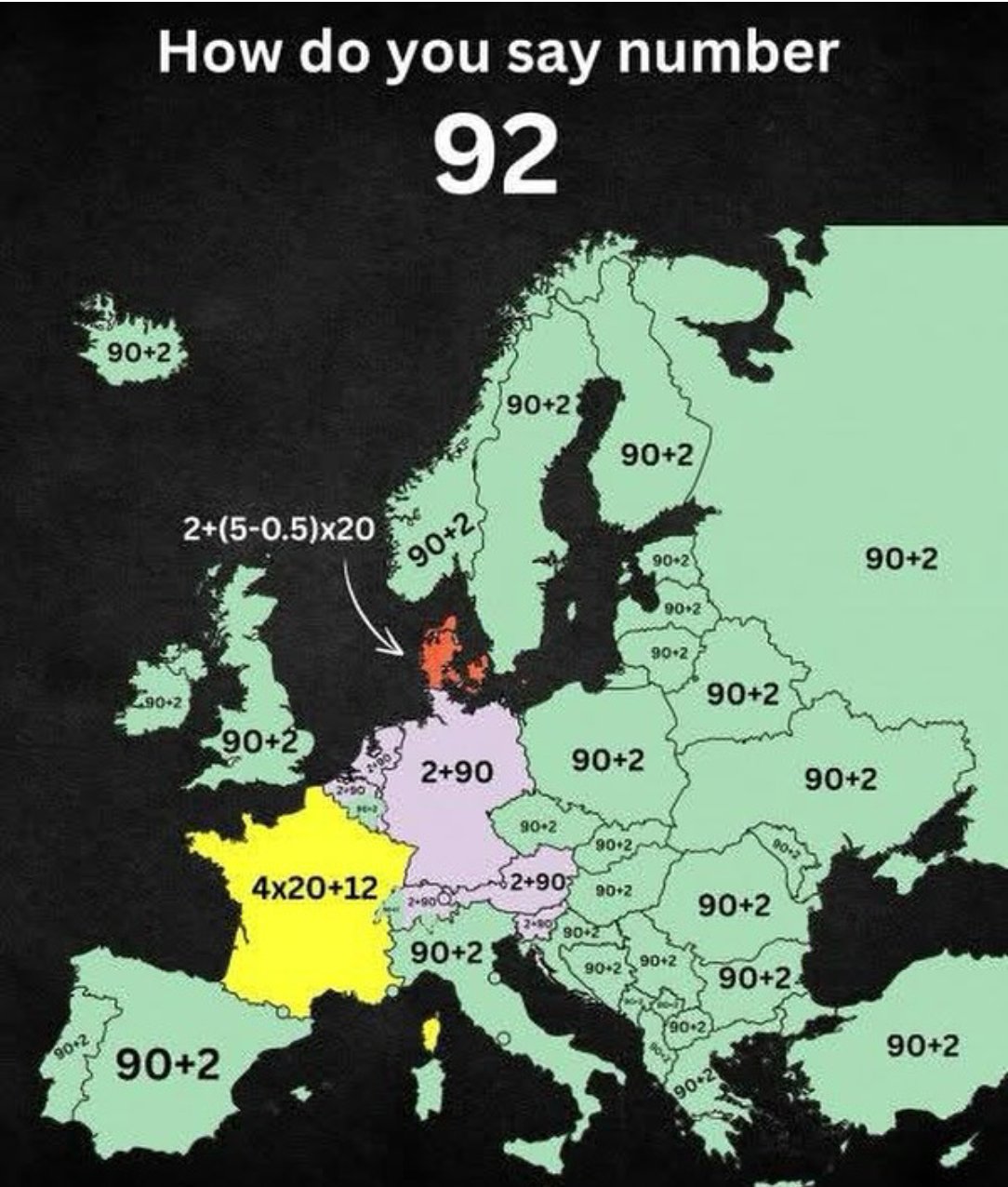Ok, Lemmy, let’s play a game!
Post how many languages in which you can count to ten, including your native language. If you like, provide which languages. I’m going to make a guess; after you’ve replied, come back and open the spoiler. If I’m right: upvote; if I’m wrong: downvote!
My guess, and my answer...
My guess is that it’s more than the number of languages you speak, read, and/or write.
Do you feel cheated because I didn’t pick a number? Vote how you want to, or don’t vote! I’m just interested in the count.
I can count to ten in five languages, but I only speak two. I can read a third, and I once was able to converse in a fourth, but have long since lost that skill. I know only some pick-up/borrow words from the 5th, including counting to 10.
- My native language is English
- I lived in Germany for a couple of years; because I never took classes, I can’t write in German, but I spoke fluently by the time I left.
- I studied French in college for three years; I can read French, but I’ve yet to meet a French person who can understand what I’m trying to say, and I have a hard time comprehending it.
- I taught myself Esperanto a couple of decades ago, and used to hang out in Esperanto chat rooms. I haven’t kept up.
- I can count to ten in Japanese because I took Aikido classes for a decade or so, and my instructor counted out loud in Japanese, and the various movements are numbered.
I can almost count to ten in Spanish, because I grew up in mid-California and there was a lot of Spanish thrown around. But French interferes, and I start in Spanish and find myself switching to French in the middle, so I’m not sure I could really do it.
Bonus question: do you ever do your counting in a non-native language, just to make it more interesting?
1. Python
for i in range(11): print(i)2. R
for (i in 0:10) { print(i) }3. C/C++
#include <iostream> int main() { for (int i = 0; i <= 10; ++i) { std::cout << i << std::endl; } return 0; }4. Java
public class CountToTen { public static void main(String[] args) { for (int i = 0; i <= 10; i++) { System.out.println(i); } } }5. Lua
for i = 0, 10 do print(i) end6. Bash (Shell Script)
for i in $(seq 0 10); do echo $i done7. Batch (Windows Command Script)
@echo off for /l %%i in (0,1,10) do ( echo %%i )8. Go
package main import "fmt" func main() { for i := 0; i <= 10; i++ { fmt.Println(i) } }9. Rust
fn main() { for i in 0..=10 { // 0..=10 includes 10 println!("{}", i); } }10. Zig
const std = @import("std"); pub fn main() !void { var i: i32 = 0; while (i <= 10) { std.debug.print("{}\n", .{i}); i += 1; } }11. Scala
for (i <- 0 to 10) { println(i) }12. Fortran
program count_to_ten implicit none integer :: i do i = 0, 10 print *, i end do end program count_to_ten13. Haskell
main :: IO () main = mapM_ print [0..10]14. Julia
for i in 0:10 println(i) endIf you didn’t cheat that’s actually pretty impressive.
It is astonishingly easy to get basically any LLM to output a simple iteration from one to ten function in all of those languages, and more.
Here’s Assembly:
newline db 0xA ; Newline character section .bss number resb 1 ; Reserve a byte for the number section .text global _start _start: mov ecx, 1 ; Start with 1 mov edx, 10 ; End with 10 loop_start: cmp ecx, edx ; Compare ecx with edx jg loop_end ; If ecx > edx, jump to loop_end ; Convert number to ASCII add ecx, '0' ; Convert number to ASCII mov [number], ecx ; Store the ASCII value in number ; Print the number mov eax, 4 ; sys_write system call mov ebx, 1 ; File descriptor 1 is stdout mov ecx, number ; Pointer to the number mov edx, 1 ; Number of bytes to write int 0x80 ; Call kernel ; Print newline mov eax, 4 ; sys_write system call mov ebx, 1 ; File descriptor 1 is stdout mov ecx, newline ; Pointer to the newline character mov edx, 1 ; Number of bytes to write int 0x80 ; Call kernel sub ecx, '0' ; Convert ASCII back to number inc ecx ; Increment the number jmp loop_start ; Jump back to the start of the loop loop_end: ; Exit the program mov eax, 1 ; sys_exit system call xor ebx, ebx ; Exit code 0 int 0x80 ; Call kernelHere’s FORTRAN
program iterate_from_one_to_ten implicit none integer :: i ! Loop from 1 to 10 do i = 1, 10 print *, i end do end program iterate_from_one_to_tenHere’s COBOL
PROGRAM-ID. IterateFromOneToTen. ENVIRONMENT DIVISION. DATA DIVISION. WORKING-STORAGE SECTION. 01 WS-Counter PIC 9(2) VALUE 1. PROCEDURE DIVISION. PERFORM VARYING WS-Counter FROM 1 BY 1 UNTIL WS-Counter > 10 DISPLAY WS-Counter END-PERFORM. STOP RUN.The assembly doesn’t print 1-10, it prints 1-9 then
:.Why does that assembly code use a global variable for a loop value?? It’s also ignoring register conventions (some registers need to be preserved before being modified by a function) which would probably break any codebase you use this in
Because it was generated by an LLM that assumes this one to ten iteration function is the entirety of all of what the code needs to do.
Yes I cheated. To be fair, I used each of those languages at one point and knew how to do it but was to lazy to look it up again.
Edit: except Fortran
Nice. Surely you could manage Lisp (or Scheme)?
God. Haskell’s monads give me nightmares.
class CountToTenis the perfect example of why I dislike Java.I might be missing something, but don’t most of these count from 0 to 10, not 1 to 10 as was requested?
Yes, that was on purpose
English:
1 2 3 4 5 6 7 8 9 10
Spanish:
1 2 3 4 5 6 7 8 9 10
French:
1 2 3 4 5 6 7 8 9 10
German:
1 2 3 4 5 6 7 8 9 10
Italian:
1 2 3 4 5 6 7 8 9 10
Greek:
1 2 3 4 5 6 7 8 9 10
Mongolian:
᠐ ᠑ ᠒ ᠓ ᠔ ᠕ ᠖ ᠗ ᠘ ᠙ ᠑᠐
The accent on the German is rather thick, though.
You know Malay too.
1 2 3 4 5 6 7 8 9 10
You show a good mastery of the hindu-arabic numerals.
I’m sorry, I just don’t recognize those, but I’d love to learn them!
Mongolian is similar to Sanskrit, and other Indo-Aryan languages: ० १ २ ३ ४ ५ ६ ७ ८ ९ १०
deleted by creator
Uno, dos, très, quatro, cinco cinco, ses
You know it’s kinda hard
You’re pretty fly
For a white guy
3 to 10 but 6 to 5
25 or 6 to 4
… siete, ocho, nueve, des!
Hah! I just needed to get started!
Spelling is probably horrible wrong, but Ima take it. 7! 7 languages, ah, ah, aahhh!

2: English and Japanese. (Took Karate classes as a kid)
Hah! Aikido was how I learned counting in Japanese!
Dutch, English, French, German, Spanish, Italian, Norwegian, Swedish, Danish, Latin, Kmer.
Wow. Impressive list!
Yeah, no issue with counting to 10. The rest however… Im really bad in learning languages, I’ve had German and French in school for 13 years yet I can’t speak either. I know English besides Dutch because of the internet and subtitles on TV. I wanted to learn languages like Norwegian, Latin and Russian but I gave up because I just don’t remember words that well. Same with history, I remember stories but can’t remember dates. I’m better at logic, like math and chemistry. But at least I know how to order up to 10 beers in multiple languages.
at least I know how to order up to 10 beers in multiple languages.
Critical life skills !
Most languages go all wonky after 10. German is pretty regular after 12 (12 is such an important number in human history!), French is absolutely insane. Conlangs like Esperanto are the really only highly regular ones.
German and Dutch (my native language) are similar systems. Still weird imo, naming the numbers in the wrong sequence: 32 is “two and thirty” instead of “thirty two”.
Check out the system of Denmark. French looks rather normal after seeing the Danish.

I love this map!
English, French, German is three.
Oh, also Scottish, American English, Australian English, New Zealand English, South African English, er… Canadian English, Irish English, Singaporean English, oh, and lots of other Xian English where X is one of the various African countries or islands of the Caribbean that use English as their official language.
Call it another 27 or so.
And they say maths is a language, so 31 total. What do I win?
Excellent. Big brain time over here, y’all!
English, Mandarin, Cantonese, Korean, Japanese, French, Spanish, German, Italian, Latin, Classical Greek.
That makes 11, I guess.
I can count to ten in just four languages, sadly.
Four is pretty good!
Japanese, English, ASL, and Spanish. Those are my four.
I’m trying to get my Japanese back to as good as it was before I came to America-proper; I spent my childhood on an Air Force base and went to a school in rural Japan. Then I learned English, and with it, my Japanese started rotting. Started really trying hard to get decent at it again for the last decade. It comes, but slowly.
I can count to ten in Spanish cause that’s the second-place language out here, and ASL cause doing 20 counts on one hand is stupid useful and I love it.
It’s so hard without immersion!
I had mandatory Swedish at school for over 6 years and I can’t even count to ten in that language. Time well spent.
Immersion is so important. Three years of French in college, and I could never make myself understood when I visited.
I can count to ten in seven languages. Not as many as some of the others here, I suppose?
Yes, I sometimes count in one of my target languages.
Languages in which I can count one to ten, along with the numbers (in words)
- Tagalog/Filipino (native): isa, dalawa, tatlo, apat, lima, anim, pito, walo, siyam, sampu
- English (school): one, two, three, four, five, six, seven, eight, nine, ten
- Cebuano (heritage speaker): usa, duha, tulo, upat, lima, unom, pito, walo, siyam, napulo
- French (school): un, deux, trois, quatre, cinq, six, sept, huit, neuf, dix
- Japanese (self-study): ichi, ni, san, shi, go, roku, shichi, hachi, kyuu, juu
- Esperanto (self-study): unu, du, tri, kvar, kvin, ses, sep, ok, naŭ, dek
- Spanish (quirk of native language): uno, dos, tres, quatro, cinco, sais, siete, ocho, nueve, diez
3.8
I can’t remember the German words for 8 and 9
Acht and neun.
Neun sounds like English nine, and acht is like October, which used to be the 8th month.
Norwegian
English
Swedish
Danish
German
Spanish
Korean
Japanese
Chinese
ArabicJust 3; English, Spanish and Japanese.
1-10 was actually like the first or second lesson I had in Japanese, along with phrases related to telling time or paying for things.
I speak three languages and I can count in ten.
Not a hard guess, to be honest, lots of people pick up numbers from popular culture (Spanish songs are big on counting, but weirdly, German ones as well). And if you study an Eastern martial art, chances are you’ll learn to count to ten in the corresponding language from your instructor.
Or I don’t know, maybe my brain is weird and I’m collecting numbers, that’s a non-zero possibility.
Well, I eliminated 30% of the competition: almost nobody is going to count in fewer languages than they speak. That leaves only the people people who’ve picked up counting but little else, and people who can count only in the languages they speak.
It wasn’t a hard guess. I thought it would be a more fun way of running the question, plus I might get some metrics out of it. If people follow the rules, we can tell what the ratio of group A to group B is by looking at down and up votes.
Huh, I was spot on with martial arts 😂
To 10? English and Spanish.
If we can drop the requirement to 5 I can add Turkish.












